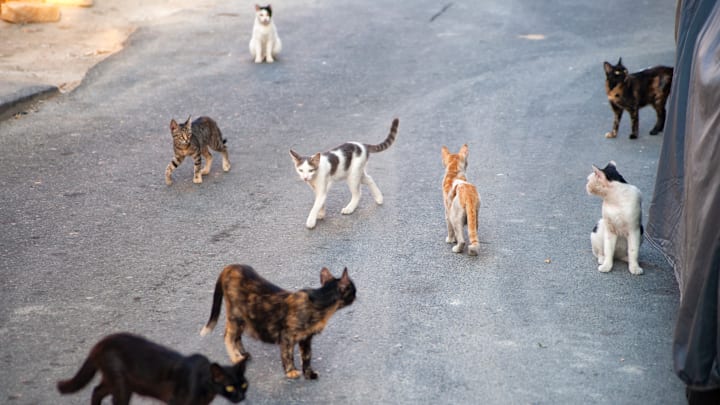Many cat lovers would relish the thought of living on an island overrun by felines. However, things are getting a little out of hand in Cyprus, a small, Mediterranean island nation where cats outnumber human residents. Now local officials are taking steps to mitigate the hair-raising issue.
One Cat for Each Resident

The cats of Cyprus are well taken care off. Many of them are pampered with tiny houses, food dispensaries, and lots of love from residents and tourists alike. But their numbers have reached unsustainable levels. To put the feline population in perspective, officials in the country estimate that there’s one undomesticated cat for every one of its million residents. And some activists believe there are many more.
With the population being so large, more cats are likely to get hurt or killed by cars. That amount of felines can also lead to an unbalanced ecosystem; outdoor cats are currently the No.1 predator of birds on Earth. Additionally, the majority of these outdoor cats aren’t spayed or neutered, which makes it unlikely that this problem will resolve on its own any time soon.
You May Also Like:
- 7 Superstitions About Cats From Around the World
- Hardware Store’s Pet Cat Returns Home After Unplanned Road Trip
- Work Hard, Graze Hard: Vermont Ski Resort Hires Goat and Sheep Landscapers
Add Mental Floss as a preferred news source!
Controlling the Cat Population
Cyprus had an established sterilization program to control the cat population, but the island’s environmental parliamentary committee recently realized that it’s not comprehensive enough to mitigate their growing numbers.
Environment Commissioner Antonia Theodosiou told the Associated Press that the program can only perform 2000 sterilizations per year with a budget of 100,000 euros, or about $117,000. Cyprus’ Environment Minister, Maria Panayiotou, announced that the budget would be raised to 300,000 euros (approximately $348,299) on October 4, 2025.
Before that can happen, however, Cyprus’s Veterinary Services must reexamine where exactly the additional funds should be allocated. To figure this out, the organization has requested that the local government submit reports on areas with high concentrations of feral cats. On top of that, it needs staff members who are well-versed in the process of capturing cats. Demetris Epaminondas, president of the Veterinary Association, tells AP that a plan that makes it easier to sterilize the cats would likely be successful; his association’s proposal involves a smartphone app designed to identify large areas where feral cats roam.
